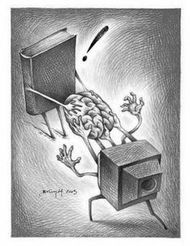|
by Emily Langford  Photo by Sincerely Media on Unsplash Photo by Sincerely Media on Unsplash As a queer, “elder millennial” who watched as personal computers suddenly took root in our homes, I experienced the rise of online fandom firsthand. Prior to the internet, my experience with fandom was a solo one, I didn’t know anyone who had the same obsessive passion for stories and characters like I had. I was the annoying kid who would, unprompted, spew out tidbits and theories about books and movies, the weirdo who was off in her own little world where all her characters existed at my day-dreamy little whims. I was tolerated at best and I eventually learned to keep my fervor to myself. I remember the first time I entered the titles of my favorite obsessions into the search bar. Suddenly, I was very much not alone. Each of my hyperfixations had a dedicated chat room or message board with other people who understood, who shared my passions. I finally found a place of acceptance.
1 Comment
 Photo by Joelle Nebbe-Mornod on Flickr Photo by Joelle Nebbe-Mornod on Flickr by Bryce Morris Since the summer of 2017, I have been writing my own social media reviews on Instagram based on pop culture topics such as film, television, comic books, and video games. Before I write my Instagram reviews, I avoid any other reviews or comments that may influence my opinion before I view the product myself. It can be difficult to prevent others from influencing my opinion. In favor of collective opinions expressed on Instagram, Twitter, and Facebook becoming the determinant, the sacred days of everyone having their own distinct opinion seem to be fading into the background. Social media sites have opened the floodgates for users to produce reviews and begin discussions of their own. Most social media users are so keen to have followers and an artificial sense of community that they will not hesitate to share misguided content. This can range widely, including news footage, articles, celebrity gossip, political prospects, and even reviews directed at several forms of media. Quite literally anyone, myself included, can go out and create a review with their smartphones or computers now, which is a scary ability that is already harming the world of entertainment. Everyone has a right to their own opinion, but when that single opinion actually stands in as the opinion of several others, then it becomes an issue within the world of creative expression.  by Laura Kincaid I watch cartoons. I’m not talking about Family Guy or Rick and Morty, but cartoons created for and targeted at children. I’m not alone. Shows like Steven Universe, Adventure Time, and Avatar: The Last Airbender have garnered huge audiences from kids to teens to twenty-somethings and older. Countless blogs and video essays propose a pile of reasons why cartoons are suddenly “not just for kids anymore” like how they relieve stress, produce a sense of nostalgia, or provide life lessons useful to everyone. But when people ask me why I watch cartoons, I answer: “For the writing.”  image credit: Pinterest image credit: Pinterest by Nicolina Givin I sat on my couch on the fourth of October and flipped through the channels on my television. I caught a glimpse of Emily Blunt grabbing a blonde by the back of her head and dragging her onto the floor. The title, The Girl on the Train, flashed at the end and I was in bewilderment. “That’s a movie now?” I thought to myself. The movie was released to theaters on the eighth. I picked up the novel, which had been sitting on my bookshelf for some time, and opened the cover, ready to finally read what everyone was about to see on the big screen. I could not have the world tell me the plot and ending before I could figure it out myself; I had to finish it before the movie release. Why was I motivated soon after that preview to read the book rather than when I first purchased that book eight months prior? The answer was always sitting there on my bookshelf, but the media pushed me towards it and spoke clearer to me in that thirty-second preview.
by Sarah Knapp
The above videos contain clips from two very different, but two very popular TV shows: RuPaul’s Drag Race and Steven Universe. What do all of these seemingly unrelated scenarios have in common? In each clip, there are quite a few different uses of pronouns, some of which seem confusing or don’t exactly fit our expectations. There is a powerful force at work here: gender is being redefined. Subtly, and sometimes very overtly, the language used to talk about gender is being changed and shaped by the media that surrounds us.
|
Archives
July 2024
Categories
All
|
|
Glassworks is a publication of Rowan University's Master of Arts in Writing 260 Victoria Street • Glassboro, New Jersey 08028 [email protected] |
All Content on this Site (c) 2024 Glassworks
|

 RSS Feed
RSS Feed
